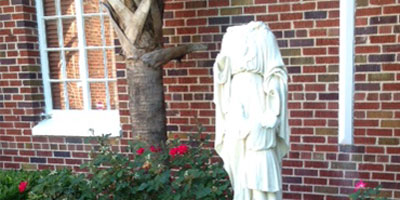
CHARLESTON—Catherine Feuerschwenger and her late husband George kept their faith in mind when planning their estate.
Mrs. Feuerschwenger, a member of St. Paul the Apostle Church in Seneca, said they used a financial planning tool called a charitable remainder trust to put money aside for their parish.
“It felt good to do something for the parish and also to save ourselves some money in the long run,” she said. “It was nice to be able to give something back.”
It’s the kind of planning too many people don’t do, according to Georgia French, a certified financial planner and senior vice president for wealth management at UBS Financial Services in Charleston.
“If you don’t do any estate planning, the Internal Revenue Service will do it for you,” French said. “If we have a moral conscience, we should want the results of all our hard work to go to the people and the causes that are near and dear to us.”
French said a very current example of what happens when people don’t plan was the recent death of music star Prince. The legendary musician died without a will or a trust, prompting what will likely be long legal battles over the millions of dollars in his estate.
French, a member of Sacred Heart Church in Charleston, will be a featured speaker at an estate planning seminar hosted by the Diocese of Charleston on Aug. 31.
Another speaker is Deacon Peter Curcio, an estate tax attorney. He said estate planning is not only common sense, but also a moral obligation for people of faith.
“Planning is important because you really need to be a good steward when it comes to the disposition of what God gave you,” Curcio said.
Ways to plan
French and Curcio said there are many simple but effective ways for people to plan.
If they do nothing else, they need to draw up a will, the most basic and straightforward way to determine where assets go, French said. If someone wants to leave half of their estate to the family and the other half to the diocese or their parish, it’s easy to state that in a will.
Another possible tool is a trust. A person can put funds in while they are alive and then designate who will be the benefactor of the trust’s income after their death. They can designate exactly how funds from the trust must be used. For instance, if they wanted to leave funds to their parish and have that money go toward the parish school, they can specify those parameters when the trust is established.
Others leave money to the church and other charities by making them the beneficiary of a life insurance policy.
Some people also choose to leave stocks or mutual funds to the Church. The diocese recently revised its directions on how to do so. See details about donating stocks here.
Stock can be made to the benefit of a parish, school, the diocese, the Bishop’s Annual Appeal, a capital campaign, or a ministry. Donors should send the name of the stock, the donor’s name and address, and the number of shares being donated to Kathryn Dannelly at 803-540-1920 or kdannelly@catholic-doc.org. Information may also be mailed to Dannelly at St. Joseph Church, 3512 Devine St., Columbia, SC 29205.
People who wish to donate mutual funds must contact Sheila Braddock at Comerica Bank, 313-222- 4218 for details on how to process the donation.
There are also ways people can plan while they are still alive.
One type of tool is a donor advised fund. Donors set up their own foundation, which is then funded with whatever assets are available, ranging from cash to real estate, antiques or stocks. Donors take the value of the asset and deduct it from their taxes as a charitable contribution. They then have to give the money to a non-profit organization in order to take a deduction. Not all of these funds have to be allocated at once, French noted.
Another option is the charitable remainder trust like the Feuerschwengers used. Property or assets are placed in a trust that can be used by a chosen charity, such as a parish, only after the donor’s death. In the meantime, the donors can receive a tax deduction and live off the income of the trust.
Yet another option is an annuity. People put funds into the annuity during their lifetime, and at their death, their parish or a designated ministry receives the money in the form of an annual payment over time.
More information
For those interested in learning more about estate planning and how to leave assets to the Church or parish, the “Leaving a Legacy” seminar will be held Aug. 31 beginning with 11:30 a.m. Mass, followed by lunch and the seminar from noon to 2 p.m. To attend, contact Anne Durney, 843-261-2437 or adurney@catholic-doc.org.


